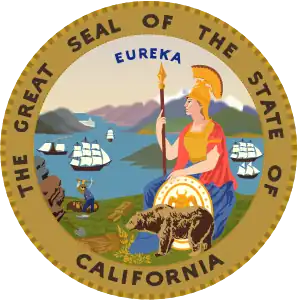Rancho San Francisquito
Rancho San Francisquito was a 1,471-acre (5.95 km2) Mexican land grant in present-day Santa Clara County, California given in 1839 by Governor Juan Alvarado to Antonio Buelna.[1] The grant was located on the southwest side of San Francisquito Creek and encompasses present-day western Menlo Park and the northern part of the Stanford University campus.[2]
History
Antonio Jose Buelna (1 September, 1790–14 November, 1842), son of José Antonio Buelna (1754–1821), married Maria Concepción Valencia (b.1798) in 1816. In 1836, José Castro, Juan Alvarado, Antonio Buelna, and José Antonio de la Guerra (son José de la Guerra y Noriega) signed a demand that GovernorNicolás Gutiérrez resign. Buelna was granted Rancho San Francisquito and Rancho San Gregorio by Alvarado in 1839. When Antonio Buelna died in 1842, María Concepción Valencia married Francisco Rodriguez, a widower and grantee of Rancho Arroyo del Rodeo.[3]
With the cession of California to the United States following the Mexican-American War, the 1848 Treaty of Guadalupe Hidalgo provided that the land grants would be honored. As required by the Land Act of 1851, a claim for Rancho San Francisquito was filed with the Public Land Commission in 1853,[4][5] and the grant was patented to María Concepción Valencia de Rodriquez in 1868.[6]
By the early 1850s squatters, including Mr. Julian, William J. Little, Thomas Bevins, Jerry Eastin, and Thomas “Sandy” Wilson, had settled on Rancho San Francisquito. A wealthy San Franciscan, George Gordon (d. 1869),[7][8] bought out the squatters and Buelna heirs in 1863. George Gordon died in 1869, and his wife, Elizabeth, died in 1874, leaving the estate to her brother, John J. Clark. Clark died in 1876 and Leland Stanford bought 650 acres (2.6 km2), known as the Mayfield Grange Farm, from Clark's widow, Margret T. Clark. The same year, Stanford bought 619 acres (2.5 km2) from D. Hoag. By 1891 Stanford had expanded his holdings to 8,248 acres (33.4 km2), including land from the adjacent Rancho Rincon de San Francisquito.[9][10] https://en.wikipedia.org/wiki/Rancho_Rincon_de_San_Francisquito
Historic sites of the Rancho
- Antonio Buelna Adobe. [11]
References
- Ogden Hoffman, 1862, Reports of Land Cases Determined in the United States District Court for the Northern District of California, Numa Hubert, San Francisco
- Diseño del Rancho San Francisquito
- Hoover, Mildred B.; Rensch, Hero; Rensch, Ethel; Abeloe, William N. (1966). Historic Spots in California. Stanford University Press. ISBN 978-0-8047-4482-9.
- United States. District Court (California : Northern District) Land Case 206 ND
- Finding Aid to the Documents Pertaining to the Adjudication of Private Land Claims in California, circa 1852-1892
- Report of the Surveyor General 1844 - 1886 Archived 2013-03-20 at the Wayback Machine
- Albert Shumate, 1976, The California of George Gordon, And the 1849 Sea Voyages of His California Association: A San Francisco Pioneer Rescued from the Legend of Gertrude Atherton's First Novel, Glendale, CA: A. H. Clark Co.
- ‘Lord’ George Gordon and South Park
- Laura Jones, Elena Reese and John W. Rick, 1996,Stanford Family's Palo Alto Home, Sandstone &Tile, Winter 1996, Stanford Historical Society, Volume 20, No. 1
- Douglas Clark,1931,Leland Stanford, Stanford University Press
- Antonio Buelna Adobe Archived 2009-10-19 at the Wayback Machine
